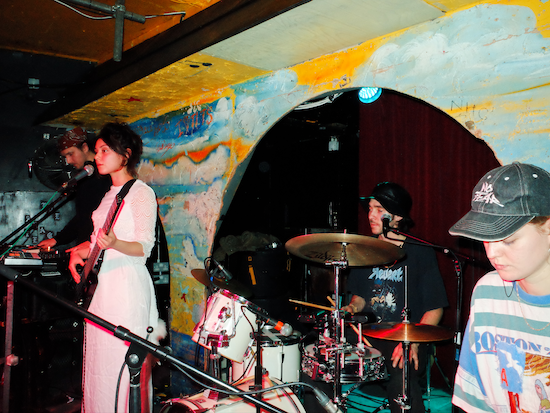Photos courtesy of South Of North
I meet Nic Mauskovic and Nushin Naini, who perform together as Devon Rexi, at The Shacklewell Arms in London. They are normally joined by Lyckle de Jong who could not make the tour this time, but sitting in on the interview are Goya van der Heyden and Tobs, bongos and turntables respectively, who join the band on stage. It was all hands to the wheel, the latter two explain, as they also played backing for the night’s headliner, Amsterdam jazz legend Ronald Langestraat.
In a world full of derivative post punk, Devon Rexi’s music offers something more vital, evoking the cool strangeness of the Burroughsian cut-up milieu of the avant 80s by making jamming and collaboration intrinsic to their process. In their music one hears elements of avant-funk and the dancey end of No Wave, and they also tap into the ‘dubbier‘ aspects of ESG and Bush Tetras, but it is not a conscious homage to those bands. Rather, it is an example of form following function; a similar process yielding similar results. For example, the doom-laden bass guitar in the introduction of ‘Sjizma’ recalls the beginning of Bauhaus’ ‘Bela Lugosi’s Dead’, yet they insist that this similarity was not deliberate.
Adds Mauskovic: “With the setup we have with the instruments, you cannot really do more than sounding like bass and drums. A lot of so-called ‘No Wave’ was non-musicians making music, and none of us write songs. We are groove people.” Although there are experimental elements to Devon Rexi that reflect No Wave’s embrace of avant-garde jazz, it’s music that ultimately rests on danceability. It’s no coincidence that Mauskovic’s background in cumbia music makes itself heard in the band’s percussion.
The band are part of a wider scene, centered around the label South Of North in their native Amsterdam, where a collaborative ethos is integral. “We all play on each other’s projects, that keeps it cheap to tour and make records. But it also makes the music all a bit wonky. Sometimes the player is new to the instrument. Nushin never played before this band, so it automatically gives this kind of quirky artsy vibe to it.” says Mauskovic.
As well as Devon Rexi’s debut EP Tambal, the imprint also put out a similarly frenetic, dubby post-punk release from van der Heyden’s band IC-Red. “South Of North feels more like a collective in a way, it’s just jamming and it doesn’t matter who’s in whose project,” she says. “We trust each other musically and we just make cool music that we like.” Adds Mauskovic: “It’s the most DIY-ish thing happening in Amsterdam, which is a slick city. Most things are pretty professional, too well-executed and a bit corporate.”
Naini and Mauskovic are the core of Devon Rexi, with other band members joining on occasion for live gigs, as available making each performance unique. The songs’ firm base of bass guitar and percussion permits collaborators to add unique textures live without detracting from the fundamental sound of the band. When they perform live in London, it’s the embrace of turntablism that gives this show its unique edge; while their debut EP Tambal is fantastic, their live sets reveal the songs as a springboard for further sonic exploration.
Turntablist Tobs discusses his contribution: “It’s not a machine that does the work for you. You sync it manually. You could technically use computers to be in sync with the band or something, make technology do that for you. But turntables, you do it yourself.” He was not originally intending to be part of the band in this way. “I was supposed to be doing effects and live sampling. But they already had someone else doing that so they asked what else I could do. I’ve DJ’d my whole life, so I feel just comfortable using the turntables as an instrument.” Playing with Devon Rexi, he says, “is a nice way to introduce people into a turntablism culture that is almost non-existent now. DJing has moved to different spaces, it seems to be something that’s so obvious, but you don’t see people actually scratching or making noise with a record.“
Nazini, meanwhile, who was born in the Netherlands to Iranian parents, sings in Farsi. “I understand Farsi but it’s harder to speak. I call the lyrical style ‘the diasporic language of the inbetween worlds’, because often second-generation migrants inherit the language of their parents without always having the opportunity to become fluent, so it’s kind of a broken language. Still Farsi, but with a heavy accent and different types of words. It’s hard to grasp because there are diasporic people and you can see them as a group, but everyone is different in that space. So it’s liminal, it’s also in your mind.”’ Onstage, she wears a Western wedding dress, plays a headless bass and sings lead vocals. “It hasn’t influenced the music except for the language. I don’t think it’s the root of the music or anything. Just the feeling of loss, maybe.”

As a vocalist she inhabits that liminal space, using her voice in an unconventional way – laid back but ghostly at the same time. It’s a sound that fits well within a wider sci-fi inspired narrative, one that’s also hinted at in the liner notes of their debut EP which tell of “Diasporic human snacks […] vibrating their sonic manipulations in tribute to the lonely & oblivious Mr. Naster.” She has been reading Phillip K. Dick, Theodore Sturgeon, “Uncle” Kurt Vonnegut and Ursula K. Le Guin. She also screened the 1984 West German Cyberpunk film Decoder (starring Einstürzende Neubauten, Genesis P-Orridge and Soft Cell) at the cinema she works at in Amsterdam, Filmtheater Kriterion. “Maybe it’s by accident again, but all that stuff influences you,” she says.
The song ‘Human Snax’, she explains, “is about a world where everything is hyper-productive and capitalist, it’s about babies and how they are deemed worthless because they’re just chubby little humans. They’re not productive enough. I was thinking of a baby factory.” The figure of Mr. Naster, she continues, “is based on a guy that I met a couple of times. He’s a Persian guy, he always forgets everyone’s names, so I made him a character in my head who is just floating through life and very lonely because he keeps forgetting everyone he meets. It’s kind of a joke song because in reality I just think he’s very rude, but I’ll make him a lonely character.”
Despite the difficulties enforced by Devon Rexi all living in different places, they continue to be proactive. They’ve recently recorded a new EP, with hopes to record more new material and another tour in the near future; for the latter, they intend to incorporate visual effects, while online they’ll soon launch a dedicated website that will “tie all our influences together.” As they further refine their visual aesthetic, listeners will be immersed more and more into an alternative world like no other.


